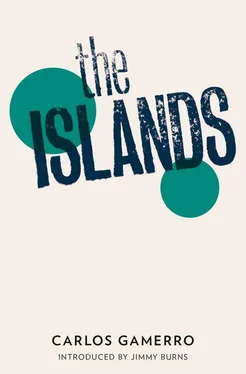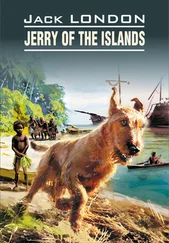‘Hard, right?’
‘There are no words to describe it,’ he said and immediately started searching for them while we reversed. ‘Two, no … three, four bombs a second were falling, you couldn’t put your head out of the foxhole, you couldn’t run, you shook inside there, like being in a blender, you felt like the walls were crushing you, your ears were exploding,’ he recounted, illustrating his point with the jolting of the taxi over the cobbled crocodile back of Calle Carranza. ‘We were all shouting, but nobody could even hear themselves, and the flares and the tracers …’
‘Turn! Turn on Soler!’ I bellowed, but he was already halfway down the next block. ‘We can take Nicaragua,’ he said, which was, of course, one-way and took us in the wrong direction. ‘Does it go the other way this side of the tracks? That’s funny, fancy that, I normally have a such good sense of direction, we got lost once in the Islands, night was falling, and we couldn’t get back to our positions …’ Voltaire, a little side street straight out of a Spanish pueblo, led on to Arévalo and, if the cabby hadn’t driven against the flow, we’d have been back to where we started. ‘Even the sergeant sat down on a stone with his head in his hands, the fog was so thick that even at this distance …’ (he gestured to the space between us) ‘… we couldn’t see each other and night was falling fast, in the Islands it used to get dark by five …’ Driving down El Salvador we passed the silos on Calle Dorrego and, Filcar in hand, I told him to take the next right. Just three more blocks, I thought gratefully. ‘… And a night in the open over there can finish you off, so I tell the sergeant, sorry Sarge, I know these fogs,’ and he braked a few metres from an impregnable wall of stone that blocked our way completely: above us, out of reach, stood the Calle Soler bridge. ‘Looks like there’s no joy this way. Let’s try the next one. They’re low fogs, rarely exceeding two hundred metres in height, I say to him, and they last all night.’ We never got as far as the next one because there was a dead end at the X of train tracks on Calle Amenábar; going by the frigging Filcar it was impossible to tell where the tracks cut the streets and where they didn’t, so we ended up reversing down Crámer to Dorrego, which the taxi driver swung onto with gay abandon, blithely regardless that it was taking us in the opposite direction. ‘Our mistake, sir, Sergeant sir, is to assume that going down hill’s the shortest route; if we go up hill, we’ll come out through the fog and be able to read the terrain from the surrounding hills like a map, then we can decide which route to take even in the dark.’ He was belting down Dorrego now, taking us further and further into the unknown, past the abandoned markets, and I breathed a sigh of relief when he turned onto Avenida Córdoba and followed the caravan of traffic down Jorge Newbery and along Álvarez Thomas to Federico Lacroze, where he turned again. ‘So we started to ascend, because we had nothing to lose, and in just over half an hour we reached the top.’ We were stuck at the level crossing in Colegiales, with the train blocking the avenue like a rebuilt Berlin Wall. It was one o’clock sharp and I was going to be late for my bizarrely scheduled appointment; it had been twenty-five minutes since I’d taken the taxi to save myself walking eight blocks. ‘And was it clear?’ I asked him stoically. ‘It was completely dark by then and the lowlands were a sea of white cloud, the hilltops peeping out just above them; but you can read the stars like a map — and I know the skies over the Malvinas like the back of my hand.’ Suddenly remembering it wasn’t a sacred cow in India, the train finally deigned to move on, but the barrier stayed down and the bell kept ringing to signal another was on its way. ‘I decided to take a bearing using the Southern Cross. The shorter arm was right over our position, and when we marched back down into the fog, we had to march in a straight line so we wouldn’t lose our way again. We climbed more hills, forded more icy rivers, crossed gruelling streams of stone, the streams of stone are … oh, you know … before we heard the sound of the sea again and caught its salty smell …’ We were now advancing along Ciudad de la Paz, floating down the street the way you do in video games, all the lights on green. ‘But our position was nowhere to be seen, and the sergeant flew into a rage: “What kind of a bloody wild goose chase is this, you stupid prat,” you know what they’re like — have you done your military service? — and there’s me standing my ground, Sergeant Sir, I’m certain, it’s got to be around here …’ Half a block before our destination, we were held up by the long file of cars waiting to cross the bridge over the tracks and I started getting the fare ready to save time. ‘Then I feel the ground give under foot, so I jump in the air, and when I land there’s this almighty clatter of corrugated iron and our lads underneath it shouting “We surrender, we surrender!” We’d only been standing on the roof of our own foxhole the whole time! Camouflaged with peat it was! The blokes inside thought we were an English patrol, so they hadn’t warned us! Then it rained ice all night. If it hadn’t been for me, we’d never have lived to tell the tale …’ At the last moment, just as everything seemed to suggest he was about to turn left on Santos Dumont, he carried on towards the bridge. ‘No! No!’ I wailed in despair, ‘don’t take the bridge!’ ‘Easy, mate; I’m not that much of a prat. Can’t you see that little street just to the side? We’ll get to Arenal much quicker that way than if we take the other one.’ We squeezed down the side street, barely as wide as the car, but the street turned back on itself and we came out on the other side of the road heading in the opposite direction. ‘Whoa, this ride’s done my head in,’ he began, as I opened the car door and got out, thrusting a note at him through the window. Needless to say he had no change and had to cross the road to a pizza parlour with my fifty while a blaring of horns from the long train of cars behind us rose into the city sky. ‘Well, it might have taken a while, but you’re not telling me it wasn’t worth the ride,’ he grinned as we parted. ‘You’ll have some stories to tell the kids tonight, I’ll bet?’ I said I certainly would and waved as he pulled away.
* * *
The owner of the paddle tennis courts — a pint-sized, lamp-burnt squirt in black satin shorts, a white eyeshade against the fluorescent glare and a fuchsia Lacoste polo shirt to bring out his tan — held out his left hand and offered me something to drink. The receptionist came back with a mineral water for me and a Gatorade for Dany. I poured out half a glass and we drank each other’s health (I couldn’t tell you why if you twisted my little finger till I screamed): Dany straight from the bottle, which he turned bottom up to quaff the greenish liquid the way they do in the ads, putting it down almost empty with a clean arc of his left hand while his right adjusted the stole of his towel, which matched his wristband. It occurred to me that every one of his gestures was designed to reinforce the contrast between his hale, relaxed life, brimming with health, and my wretched, stressed-out city existence, and, unable to stop myself, I stuffed a finger inside the neck of my shirt, which felt somehow dirtier and tighter, the skin on my hands looking yellow beside his tan.
I explained the reason for my visit, asked the question, the answer to which revealed the secret identity of Gazza Gascoigne (eighteen down …) signed the cheque under his nose and handed it to him. He took it in his right hand, when I’d aimed for his left. He was starting to make me dizzy. All this time nothing I’d said or done had been able to dislodge the fixed smile of satisfaction on permanent display below his golden moustache, as if the thousand-dollar windfall were just another daily confirmation that that exclusive service industry called destiny was working away as perfectly as well-chosen health insurance. No wonder he’d earned his fox badge in less than a month.
Читать дальше











